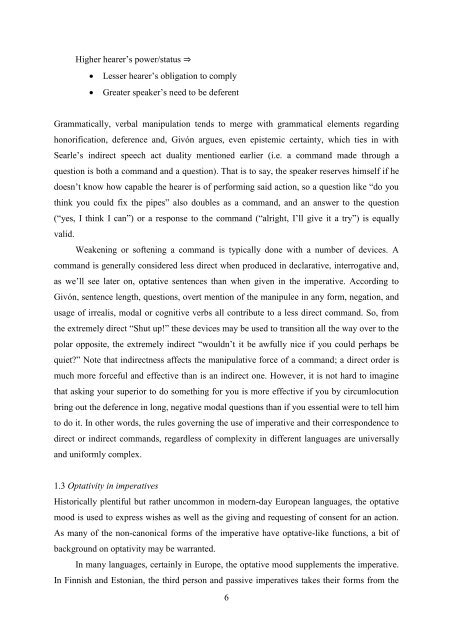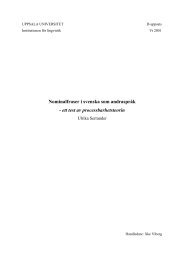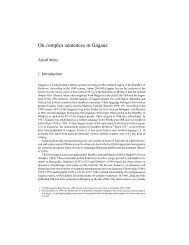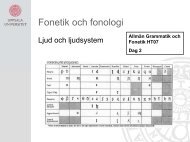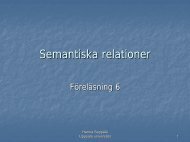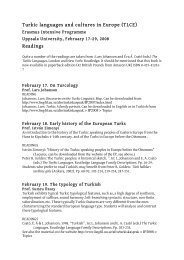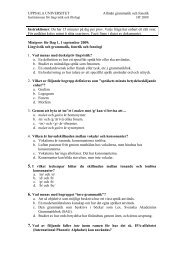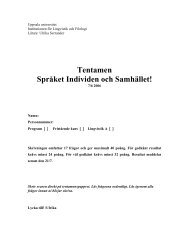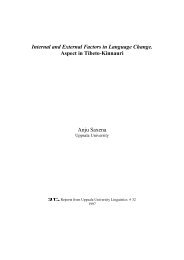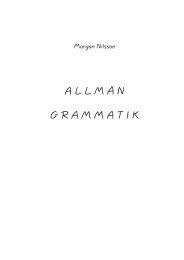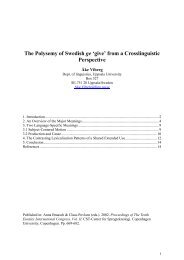The function of non-canonical imperatives in the languages of Europe
The function of non-canonical imperatives in the languages of Europe
The function of non-canonical imperatives in the languages of Europe
Create successful ePaper yourself
Turn your PDF publications into a flip-book with our unique Google optimized e-Paper software.
Higher hearer’s power/status ⇒<br />
<br />
<br />
Lesser hearer’s obligation to comply<br />
Greater speaker’s need to be deferent<br />
Grammatically, verbal manipulation tends to merge with grammatical elements regard<strong>in</strong>g<br />
honorification, deference and, Givón argues, even epistemic certa<strong>in</strong>ty, which ties <strong>in</strong> with<br />
Searle’s <strong>in</strong>direct speech act duality mentioned earlier (i.e. a command made through a<br />
question is both a command and a question). That is to say, <strong>the</strong> speaker reserves himself if he<br />
doesn’t know how capable <strong>the</strong> hearer is <strong>of</strong> perform<strong>in</strong>g said action, so a question like “do you<br />
th<strong>in</strong>k you could fix <strong>the</strong> pipes” also doubles as a command, and an answer to <strong>the</strong> question<br />
(“yes, I th<strong>in</strong>k I can”) or a response to <strong>the</strong> command (“alright, I’ll give it a try”) is equally<br />
valid.<br />
Weaken<strong>in</strong>g or s<strong>of</strong>ten<strong>in</strong>g a command is typically done with a number <strong>of</strong> devices. A<br />
command is generally considered less direct when produced <strong>in</strong> declarative, <strong>in</strong>terrogative and,<br />
as we’ll see later on, optative sentences than when given <strong>in</strong> <strong>the</strong> imperative. Accord<strong>in</strong>g to<br />
Givón, sentence length, questions, overt mention <strong>of</strong> <strong>the</strong> manipulee <strong>in</strong> any form, negation, and<br />
usage <strong>of</strong> irrealis, modal or cognitive verbs all contribute to a less direct command. So, from<br />
<strong>the</strong> extremely direct “Shut up!” <strong>the</strong>se devices may be used to transition all <strong>the</strong> way over to <strong>the</strong><br />
polar opposite, <strong>the</strong> extremely <strong>in</strong>direct “wouldn’t it be awfully nice if you could perhaps be<br />
quiet” Note that <strong>in</strong>directness affects <strong>the</strong> manipulative force <strong>of</strong> a command; a direct order is<br />
much more forceful and effective than is an <strong>in</strong>direct one. However, it is not hard to imag<strong>in</strong>e<br />
that ask<strong>in</strong>g your superior to do someth<strong>in</strong>g for you is more effective if you by circumlocution<br />
br<strong>in</strong>g out <strong>the</strong> deference <strong>in</strong> long, negative modal questions than if you essential were to tell him<br />
to do it. In o<strong>the</strong>r words, <strong>the</strong> rules govern<strong>in</strong>g <strong>the</strong> use <strong>of</strong> imperative and <strong>the</strong>ir correspondence to<br />
direct or <strong>in</strong>direct commands, regardless <strong>of</strong> complexity <strong>in</strong> different <strong>languages</strong> are universally<br />
and uniformly complex.<br />
1.3 Optativity <strong>in</strong> <strong>imperatives</strong><br />
Historically plentiful but ra<strong>the</strong>r uncommon <strong>in</strong> modern-day <strong>Europe</strong>an <strong>languages</strong>, <strong>the</strong> optative<br />
mood is used to express wishes as well as <strong>the</strong> giv<strong>in</strong>g and request<strong>in</strong>g <strong>of</strong> consent for an action.<br />
As many <strong>of</strong> <strong>the</strong> <strong>non</strong>-ca<strong>non</strong>ical forms <strong>of</strong> <strong>the</strong> imperative have optative-like <strong>function</strong>s, a bit <strong>of</strong><br />
background on optativity may be warranted.<br />
In many <strong>languages</strong>, certa<strong>in</strong>ly <strong>in</strong> <strong>Europe</strong>, <strong>the</strong> optative mood supplements <strong>the</strong> imperative.<br />
In F<strong>in</strong>nish and Estonian, <strong>the</strong> third person and passive <strong>imperatives</strong> takes <strong>the</strong>ir forms from <strong>the</strong><br />
6


